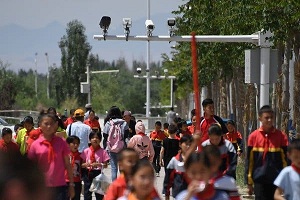China’s far-reaching security network is targeting tourists, with border guards secretly installing a surveillance app onto the phones of visitors to Xinjiang, according to a joint report by several major international media organizations.
If true, it would be the latest move to tighten surveillance in the heavily-repressed region, where the US State Department has estimated up to two million Muslim-majority Uyghurs are being held in detention camps. There is a heavy police presence across Xinjiang and security cameras there are a common sight. From 2017, the Chinese government began to collect DNA and biometric data from millions of local residents.
The new joint investigation by organizations, including the Guardian and the New York Times, alleges the crackdown is now affecting visitors and tourists to the region. CNN has not been able to independently verify the report. According to media reports, visitors arriving in Xinjiang from neighboring Kyrgyzstan have been forced to unlock their phones for border officials, who then install an application called Fengcai. The name is a combination of the characters for “bee” and “to gather,” conjuring the image of a bee gathering pollen from a flower.
People whose phones had been confiscated said they were given no warning of or explanation for the app’s installation. Once installed, the app allegedly scans the device’s text messages, call records, contacts, calendar entries and saved data for a list of more than 73,000 red-flag items, according to the reports. The images and information considered noteworthy by the app include files linked to Islamic extremism, such as ISIS propaganda, and pictures of the Tibetan spiritual leader the Dalai Lama, according to the reports.








